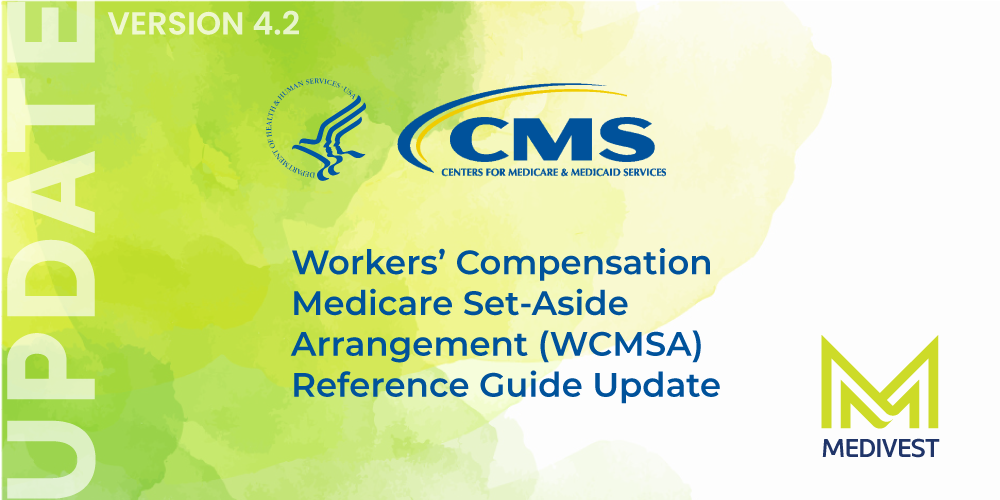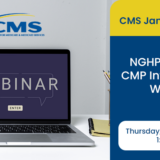This year’s conference theme, “The Sea of Risk Management,” reflects the ever-shifting challenges we face and the skill, strategies, and collaboration required to navigate them.
The Medivest Blog
On March 9-11, 2026, the Colorado Workers’ Compensation Educational Conference (CWCEC) returns to the Broadmoor in Colorado Springs.
ELEVATE is dedicated to advancing Workers’ Compensation by tackling the system’s most significant challenges and inspiring leaders to make a meaningful impact.
CMS will be hosting an Introduction to WCMSAs Webinar. The intent of this webinar is to go over the basics of WCMSAs including purpose, submission guidelines and administration as well as to offer some WCMSA best practices. The presentation will be followed by a question-and-answer session. As this Webinar is intended to provide a general overview of the WCMSA process, questions regarding specific cases are not appropriate for this setting. Those involved in the submission and administration of WCMSAs, including attorneys and Medicare beneficiaries, are encouraged to attend.
Date: June 17, 2025
Time: 2:00 PM ET
Webinar Link: https://cms.zoomgov.com/j/1605891582?pwd=7NeMcu0ezDDwYCCRiezZMY2MLiXY0d.1
Passcode: 922100
Or to connect via phone:
Conference Dial In: 1-833-568-8864
Conference Passcode: 160 589 1582
Important Note: This is a public webinar, and there is no pre-registration. The link above will not be active until the day of the webinar.
Additional information about the most recent updates from CMS can be found here. If you have questions on how topics discussed in this webinar may affect your clients or your company, please contact Medivest or call us at 877.725.2467.
An Inns of Court is an association of lawyers, judges, and other legal professionals from all levels and backgrounds who share a passion for professional excellence.
WCI's annual Workers’ Compensation Educational Conference and brings together workers’ compensation professionals from across the country.
Centers for Medicare & Medicaid Services (CMS) has revised the WCMSA Reference Guide to reflect recent changes in CMS policy and Section 111 reporting requirements. Version 4.3, dated April 7, 2025 has three notable changes:
1) A Notice of Settlement Received letter has been added to the Guide at Appendix 5 to support the new Mandatory Workers’ Compensation Medicare Set-Aside (WMSA) reporting requirements;
2) The one year waiting period for the Amended Review of MSAs has been removed from Section 16.3; and
3) The revised Reference Guide provides additional clarity around CMS’ change of MSA submitter policies (Sections 16.3 and 19.4).
For Additional Information
Medivest will continue to monitor changes occurring at CMS and will keep its readers up to date when such changes are announced. For questions, feel free to reach out to the Medivest representative in your area by clicking here or call us direct at 877.725.2467.
Starting April 4, 2025, significant changes are coming to Section 111 reporting requirements for workers’ compensation claims involving Medicare beneficiaries. If you’re a Responsible Reporting Entity (RRE), it’s time to prepare for a broader scope of data reporting, especially when it comes to Workers’ Compensation Medicare Set-Asides (WCMSAs).
Under the new requirements, all workers’ compensation claims involving a Total Payment Obligation to the Claimant (TPOC) must now include WCMSA-related data when the injured party is a Medicare beneficiary. This applies regardless of whether the WCMSA was reviewed or approved by Medicare. CMS has updated reporting requirements published in the NGHP User Guide of the MMSEA Sections 111, which you can view the following chapters below.
Here is a breakdown of what needs to be reported:
-
- Medicare-Approved WCMSAs:
- If your settlement includes a WCMSA that was reviewed and approved by CMS, you must report the relevant WCMSA data.
- WCMSAs Below the Review Threshold:
- Even if the WCMSA wasn’t submitted for CMS review because the total settlement amount falls below the Medicare workload review threshold, the WCMSA information still needs to be reported.
- Zero-Dollar WCMSAs:
- When a settlement explicitly states that no funds are allocated for future medical care, this is considered a Zero-Dollar WCMSA. These must also be reported.
- Unsubmitted WCMSAs:
- If the parties developed an MSA or allocated funds for future medical treatment but chose not to submit it to Medicare, that information must now be disclosed.
- Medicare-Approved WCMSAs:
What Should You Do Now?
If you’re a claims professional, insurer, or third-party administrator, be prepared to:
-
- Review your Section 111 reporting processes and confirm they can handle the new data requirements that can be found.
- Coordinate with your WCMSA vendors to ensure you receive the necessary data for inclusion in your reporting.
- Educate your claims team and legal partners about the upcoming changes so all parties are aligned before April 4.
Takeaways
The expanded Section 111 reporting requirements reflect CMS’s ongoing efforts to protect the Medicare Trust Funds. While they may add complexity to the reporting process, these changes also provide an opportunity for claims handlers to strengthen compliance and improve documentation practices.
For Additional Information
As always, Medivest remains committed to assisting our clients with the creation and administration of WCMSAs. Medivest will continue to monitor changes occurring at CMS and will keep our readers up to date when any new changes are announced. For questions, feel free to reach out to the Medivest representative in your area by clicking here or call us at 877.725.2467.
PARMA is dedicated to the professional development of all California public agency personnel with responsibility for risk management, and to the promotion of risk management as a critical component for public agency fiscal health.
On January 17, 2025, CMS updated its Workers’ Compensation Medicare Set-Aside Arrangement (WCMSA) Reference Guide to reflect a new policy in Section 4.2 to no longer review zero-dollar WCMSAs as of July 2025. Other announced changes in the WCMS Reference Guide, now in version 4.2, include an update of WCRC Review Considerations in Section 9.4.3 and corrected example calculations for Intrathecal Pump, Spinal Cord Stimulator, and Peripheral Nerve stimulator replacements were made in Section 9.4.5.
On January 21, 2025, CMS indicated via email and its website that it will be implementing two operational changes to the WCMSA review process in the first half of 2025 as follows:
“Amended Reviews: Currently, amended review requests cannot be submitted until 1 year after a WCMSA case has been approved. Effective April 7, 2025, amended review requests will be allowed at any time after a WCMSA case is approved.
Zero-Dollar Set-Asides: Effective July 17, 2025, CMS will no longer accept or review WCMSA proposals with a zero-dollar ($0) allocation. Entities should still consider the parameters available in the WCMSA Reference Guide (PDF) to determine whether a zero-dollar WCMSA allocation is appropriate and should maintain documentation to support that allocation.”
As a refresher, the WCMSA Reference Guide, in Section 4.2, which describes when a zero-dollar MSA is appropriate, used to list three conditions to determine when Medicare’s future interests in a Workers’ Compensation settlement had been protected. The Reference Guide’s updated Section 4.2 has been revised significantly, and now includes only two conditions to indicate when Medicare’s future interests are protected in a WC settlement with several examples of when the second condition is met as listed in the text below:
“4.2 Indications That Medicare’s Interests Are Protected
Submitting a WCMSA proposed amount for review is never required. But WC claimants must always protect Medicare’s interests. A WCMSA is not necessary under the following conditions because when they are true, they indicate that Medicare’s interests are already protected:
a) The facts of the case demonstrate that the injured individual is only being compensated for past medical expenses (i.e., for services furnished prior to the settlement); and
b) There is no evidence that the individual is attempting to maximize the other aspects of the settlement (e.g., the lost wages and disability portions of the settlement) to Medicare’s detriment.
These conditions may be demonstrated through one of the following:
• The individual’s treating physician documents in medical records that to a reasonable degree of medical certainty the individual will no longer require any treatments or medications related to the settling WC injury or illness; or
• The workers’ compensation insurer or self-insured employer denied responsibility for benefits under the state workers’ compensation law and the insurer or self-insured employer has made no payments for medical treatment or indemnity (except for investigational purposes) prior to settlement, medical and indemnity benefits are not actively being paid, and the settlement agreement does not allocate certain amounts for specific future or past medical or pharmacy services as a condition of settlement; or
• A Court/Commission/Board of competent jurisdiction has determined, by a ruling on the merits, that the workers’ compensation insurer or self-insured employer does not owe any additional medical or indemnity benefits, medical and indemnity benefits are not actively being paid, and the settlement agreement does not allocate certain amounts for specific future medical services; or
• The workers’ compensation claim was denied by the insurer/self-insured employer within the state statutory timeframe allowed to pay without prejudice (if allowed in that state) during investigation period, benefits are not actively being paid, and the settlement agreement does not allocate certain amounts for specific future medical services.
In addition, if a settlement leaves WC carriers with responsibility for ongoing medical and prescription coverage once the settlement funds are fully spent, then a WCMSA is not necessary.
Effective July 17, 2025, CMS will no longer accept or review WCMSA proposals with a zero- dollar ($0) allocation. Entities should consider the above parameters in determining whether a zero-dollar WCMSA allocation is appropriate and maintain documentation to support that allocation.
Notes:
… If Medicare made any conditional payments for WC injury-related services furnished prior to settlement, then Medicare will recover those payments. In addition, Medicare will not pay for any WC injury-related services furnished prior to the date of the settlement for which it has not already paid.
CMS will not issue “verification letters” stating that a WCMSA is not necessary.
In instances where the above conditions are not met, CMS’ voluntary, yet recommended, WCMSA amount review process is the only process that offers both Medicare beneficiaries and Workers’ Compensation entities finality, with respect to obligations for medical care required after a settlement, judgment, award, or other payment occurs. When CMS reviews and approves a proposed WCMSA amount, CMS stands behind that amount. Without CMS’ approval, Medicare may deny related medical claims, or pursue recovery for related medical claims that Medicare paid up to the full amount of the settlement, judgment, award, or other payment.”
The second to last paragraph of Section 9.4.3 was substituted from:
“The WCRC relies on evidence-based guidelines for prescription medication and medical treatment allocations; however, these are guidelines, not rules. The final determination is also based on the claimant’s past use and future recommended treatment as supported by the medical records and by current peer-reviewed medical literature. See Appendix 4 for a list of resources the WCRC uses.”
to the following:
“The WCRC final determination relies on the claimant’s past use and future recommended treatment as supported by the medical records. Evidence-based guidelines for prescription medication and medical treatment allocations and current peer-reviewed medical literature are also reviewed; however, these are guidelines, not rules. See Appendix 4 for a list of resources the WCRC uses. Treating provider plans are given preference where the two are at odds.”
The corrected example calculations in 9.4.5 for intrathecal (IT) pump pricing should be reviewed by allocators and their price coders to make sure that WCMSA pricing for IT pumps is consistent with the corrected calculations in the updated Reference Guide.
Take Aways:
• The new “no review” policy for zero-dollar MSA’s seems driven in large part to spirited feedback provided to CMS from the WCMSA community. There were several CMS panel discussions with MSP Network membership at the September 2024 MSP Network educational conference in Baltimore during which many of the concerns now addressed in updated Section 4.2 of the Reference Guide concerning WC cases with no payments toward denied body parts (other than during investigation periods), determinations made by WC judges/commissions at the state level, and statutory limits on payment of future medicals by WC carriers were brought up and debated.
• The drop of the one year waiting period before submitting Amended Reviews is another step toward more fair reviews by CMS and also seems to be a result of strong advocacy by those who submit allocation reports, the attorneys, who represent those entities, and the MSP Network stakeholder community at large.
• This is encouraging as it shows that CMS does listen to feedback from the MSP stakeholder community.
For Additional Information
Medivest will continue to monitor changes occurring at CMS and will keep its readers up to date when such changes are announced. For questions, feel free to reach out to the Medivest representative in your area by clicking here or call us direct at 877.725.2467.










